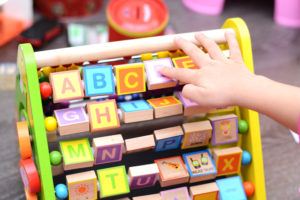Ask the Expert: Holiday Toy Guide

It’s that time of year again, and everyone is asking, “What should we get _____ (insert your precious child’s name) for the holidays?” It’s easy
to feel overwhelmed when coming up with an answer, especially when it seems like your entire house is ALREADY full of things just for said child. As a Mama to two little bits and a pediatric Speech Language Pathologist, I get asked a lot what toys promote development, especially in the areas of communication and social skills. So here are some thoughts as you begin deciding what gifts to buy this holiday season.
Play gives your child a great opportunity to develop and practice skills at their own pace by following their unique interests. The toys you choose can shape, for the better, the developmental skills that benefit your child as they grow. Imagination is the most important skill you can impart to your child when they are very young. Learning to pretend and imagine will help as they learn to think creatively and solve problems later in life. Research into early brain development tells us how important play with physical toys in an “unplugged” setting can be to growing brains strong in language, math, and social skills. The more opportunities you can give your little ones to come up with their own ideas, especially with your guidance, the more their brains will stretch and grow! Here are some guidelines for all gift buyers you might share:
Choose toys that can be used in a variety of ways.
As children learn to take things apart and put back together, they are not only strengthening their hands, but also their minds! Selecting toys (and a basket to contain them ) that can be pulled apart, put together, added onto, and built upon means that you are giving them many more opportunities to build imagination skills, as well as spatial relations skills and hand eye coordination. Toys that require physical manipulation are the best way to build early skills in logical thinking and persistent problem solving. For example, wooden blocks can be used to make a road, a spaceship, or a house for people to live in. Or chunky puzzles can be put together, or the pieces can be played with on their own.
Examples: Blocks, Legos, nesting blocks or cups, shape sorters, art materials, puzzles
Look for toys that grow with your child.
We have all had THOSE toys- the one that looks like SO much fun, has lights and sound and is brightly colored- the toy they LOVE for a month or two, and then it begins taking up space as your child moves past it developmentally. You can guard against this, and make wise investments in toys, by looking for toys that are appropriate at all developmental stages. For example, a younger child may love a small set of animals as they are learning to make animal sounds and take them in and out of containers, but as that child gets older, the animals may become members of a travelling zoo that can entertain your entire house!
Examples: Plastic animals and action figures, houses and barns, trains and dump trucks, stuffed animals and dolls in their favorite characters
Select toys that encourage independent imagination.
During early childhood development and beyond, nurturing your child’s creativity is so important as they begin to pretend play. Look for toys that they can use to act out stories. Pretend play builds language and literacy skills, problem solving skills, and sequencing skills necessary as your child grows cognitively. It is so important, as well, that both boys and girls learn to play pretend. Boys love kitchen and baby play just as much as girls, and teaching nurturing skills is so valuable as we teach social skills to growing minds. By the same token, girls love to play with trucks and tools!
Examples: dress up clothes, toy food and plastic plates, action figures and baby dolls, toy tools
Seek toys that encourage your child to be active.
Young children need to be physically active as much as possible- playing outside is the best way to get energy out and help young bodies grow in strength and confidence. Your job is to encourage and cheer as they move and experiment with what their body can do! Look for toys that help your child practice current physical skills and develop new ones.
Examples: Balls of different shapes and sizes, tricycles and scooters (be sure to include head protection!), bowling sets, basketball hoops, pull toys, a wagon, gardening tools, play tents
Look for toys that nurture cross-generational play.
While adults and children can play anything together, there are some toys that are designed for adult participation. Early board games that involve using memory and matching skills are fun for all ages to play. A family game night can become a gift that keeps giving! Board games can also encourage counting, listening skills, and encourage self- control and following the rules. Games like these can be great tools for teaching graceful loosing and taking- turns.
Examples: Chutes and Ladder, Hi-Ho Cherrio, Hungry Hungry Hippos, and many more!
Many blessings this holiday season and happy playing!
Melissa Pouncey, M.S. CCC-SLP, is one of many experienced therapists at United Ability’s Ability Clinic where we offer speech, occupational, and physical therapy for children from 6 weeks through age fourteen. To find out how our experienced therapists can help a child you care about, please call 205-944-3944.
